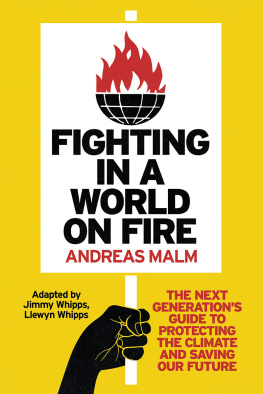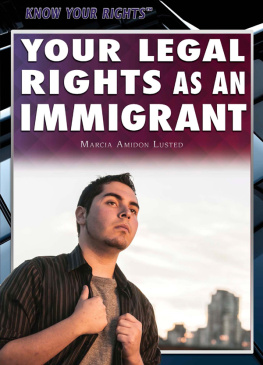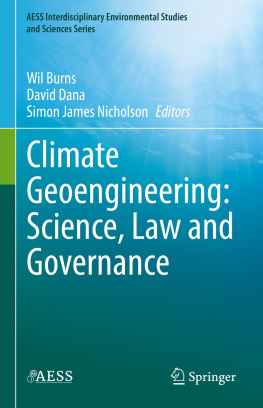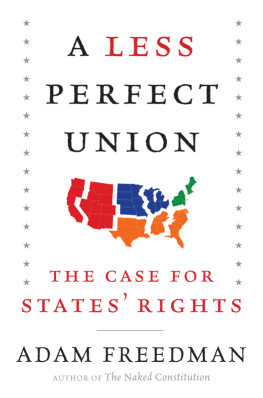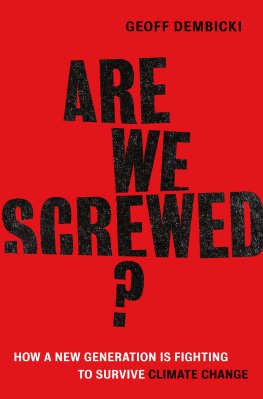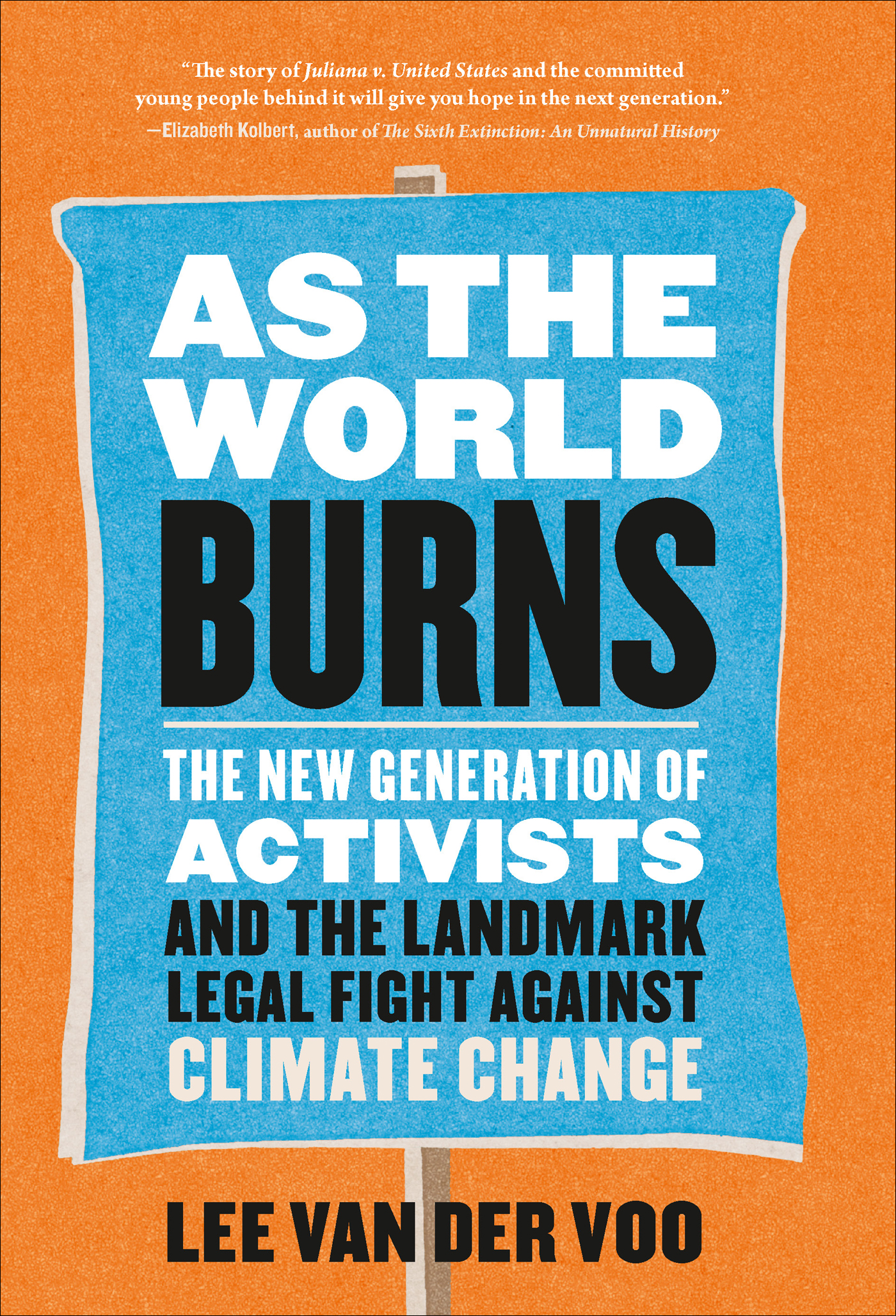Contents
Guide
Page List

Lee van der Voo
Lee van der Voo is an award-winning investigative and environmental journalist whose work has appeared in the New York Times, The Atlantic, and The Guardian, among others. Her 2016 book, The Fish Market, which chronicles the gentrification of the sea in the name of sustainable seafood, won an Oregon Book Award for General Nonfiction.
AS THE
WORLD
BURNS
THE NEW GENERATION OF
ACTIVISTS
AND THE LANDMARK
LEGAL FIGHT AGAINST
CLIMATE CHANGE
LEE VAN DER VOO

Copyright 2020 by Lee van der Voo. All rights reserved.
Published in 2020 by Timber Press, Inc.
The Haseltine Building
133 S.W. Second Avenue, Suite 450
Portland, Oregon 97204-3527
timberpress.com
Text and jacket design by Matt Avery
eISBN 978-1-64326-050-1
Catalog records for this book are available from the Library of Congress and the British Library.
One of the benefits of fighting for a cause at a young age is that your ideas have no boundaries. It allows you to use your creativity and imagination to solve problems. We just followed our hearts and did what we thought was right. We didnt listen to anybody who was trying to tell us that we were too young or that our voices didnt matter.
XIUHTEZCATL MARTINEZ , We Rise: The Earth Guardians Guide to Building a Movement That Restores the Planet (with Justin Spizman)
Contents
CHAPTER ONE
October 29, 2018: A Crisis at Hand, a Nation Consumed
The sky tears open and drops out of itself. It is fall in Oregon, so the rain is not a surprise. The surprise is that the court is mostly vacant, the trial hasnt started, and nineteen of the twenty-one young people who are suing the federal government over climate change are standing on the steps having a protest instead.
They have come from all over the nation, from Hawaii and Alaska and New York, most traveling from landscapes already scarred by worsening weather. The youngest came from a barrier island off the east coast of Florida, where a red tide has just invaded the beaches and the fish are turning up dead. Another, from Colorado, has been hunkered down indoors with air purifiers during the worst fire season in the states history. A third is living on a concrete slab in Louisiana, her family not yet able to replace their floors after a flood two years ago, courtesy of torrential rain. Collectively, they are litigating the deaths of fruit trees; the swallowing of islands; injuries to farming, fishing, and recreation; and the relentless worsening of wildfires in the West. They wear suit jackets and skirts and expressions of frustration and defiance.
Things do not work as they used to. That much is clear.
Philip Gregory, an attorney for the young plaintiffs, will soon clarify the rest. He approaches a podium midway up the steps to this courthouse in the Ninth Circuit and offers what the days emcee terms an update directly from the legal team.
He begins with something of a war cry.
In August 2015, these young plaintiffs filed this lawsuit. This. Is. No. Ordinary. Lawsuit!
His words are broadcast by speakers on both sides of the podium while the rain kindly slows its drumbeat on a pop-up tent overhead. The weather has been blustery enough that someone thought to strap the tent to cinder blocks, but the crowd seems mostly unfazed. Clad in rain hats and waterproof jackets, hoodies and damp sweaters, about fifteen hundred people are already shouting. Organizers have been pumping them full of funk music, and a tribal elder just called the plaintiffs guardians of the earth. People are amped.
Gray hair swept back, Gregory describes the case as a constitutional one, brought by youth who are taking on the feds. These young people this morning were supposed to walk into this courtroom and begin putting the climate science into evidence. But the federal government is waging a war defending the fossil fuel interests! The crowd boos. One man behind me shouts: Actually, I think its the Koch brothers!
The federal government has taken their fight all the way up to the United States Supreme Court! Gregory hollers. And theyre choosing the fossil fuel companies over these young plaintiffs, over the youth of America, over our posterity!
This is his way of detailing why the Supreme Court just stalled the plaintiffs case, Juliana v. United States, ten days before trial. Its a lawsuit that posits that young peoplethe plaintiffs, and future generations toohave a constitutional right to a stable climate. Its charge is that the governments actions to cause climate change violate their civil rights to life, liberty, and property. Not only that, but also that the government has known about the risks of climate change for decades and persisted in helping to cause it anyway, failing to implement its own plans to regulate greenhouse gases while subsidizing, authorizing, and permitting a fossil fuel energy system that worsens global warming every day.
The case is only one piece of a legal battle led by the Eugene-based Our Childrens Trust, a public interest law firm that helps young people fight climate change. But its a big piece. The only federal piece still standing. Whether now or later, its the piece most likely to finish in the Supreme Court, making it one of the most important lawsuits of our time. What makes it especially unique is that the US government does not plan to dispute climate science at trial. Its experts have already conceded in documents that climate change is an urgent threat and that the United States is solely responsible for 25 percent of global carbon accumulation since the industrial agemore than any other entity on Earth. What looms for America is less another scientific debate, another fresh round of punditry, than an overdue public awakening. In a nation with dramatic influence on climate issues worldwide, this is the trial.
Now the plaintiffs stand beside Gregory against the glass facade of the federal courthouse, festooned as it is with banners: Give Science Its Day in Court. Let the Youth Be Heard. Theirs is not so much a formal flanking as a DIY ethos that has them scattered all over the steps. They are energized and at least a little bit angry.
Four are in imminent danger of being displaced by climate change. Six are Indigenous, battling for land and culture. Two are competitive skiers adapting to slush. And another duo were raised on farms threatened by the proposed path of a natural gas pipeline. To say they are being cheered by the liberal town of Eugene, Oregon, is to minimize the fanfare. Placards outnumber umbrellas. Vendors sell hot chocolate under tents. And police have blocked off the street so supporters, some from as far away as Alaska, can carry banners through golden leaves without fear of a traffic incident.
Represented as they are, they are plainly not the youth of Internet-troll lore, stage-managed by hand-wringing parents who coach them from beyond the frame. Never is that more obvious than in situations like this one, in which the plaintiffs command the crowd while their parents are left alone to make friends, always the first to look tired. While some of the parents are activists, too, and introduced their children to the cause, often it is the reverse. Either way, each young plaintiff joined the case on their own, heard about it from some corner of their own world. Whether the adults followed them more deeply into the fight is beside the point.


